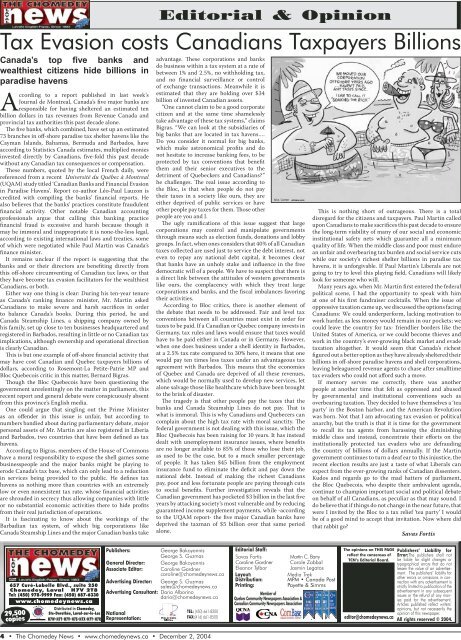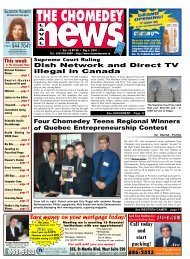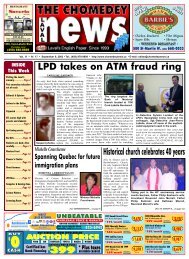Inside tcn - Laval News
Inside tcn - Laval News
Inside tcn - Laval News
Create successful ePaper yourself
Turn your PDF publications into a flip-book with our unique Google optimized e-Paper software.
657 Curé-Labelle Blvd., suite 250<br />
Chomedey, <strong>Laval</strong> H7V 2T8<br />
Tel: (450) 978-9999 Fax: (450) 687-6330<br />
Distributed in Chomedey,<br />
Ste-Dorothée, <strong>Laval</strong>-sur-le-Lac<br />
H7W•H7T•H7V•H7S•H7X•H7Y•H7R<br />
4 • The Chomedey <strong>News</strong> • www.chomedeynews.ca • December 2, 2004<br />
Editorial & Opinion<br />
Tax Evasion costs Canadians Taxpayers Billions<br />
Canada’s top five banks and<br />
wealthiest citizens hide billions in<br />
paradise havens<br />
According to a report published in last week’s<br />
Journal de Montreal, Canada’s five major banks are<br />
responsible for having sheltered an estimated ten<br />
billion dollars in tax revenues from Revenue Canada and<br />
provincial tax authorities this past decade alone.<br />
The five banks, which combined, have set up an estimated<br />
73 branches in off-shore paradise tax shelter havens like the<br />
Cayman Islands, Bahamas, Bermuda and Barbados, have<br />
according to Statistics Canada estimates, multiplied monies<br />
invested directly by Canadians, five-fold this past decade<br />
without any Canadian tax consequences or compensation.<br />
These numbers, quoted by the local French daily, were<br />
referenced from a recent Université du Québec à Montreal<br />
(UQAM) study titled ‘Canadian Banks and Financial Evasion<br />
in Paradise Havens’. Report co-author Léo-Paul Lauzon is<br />
credited with compiling the banks’ financial reports. He<br />
also believes that the banks’ practices constitute fraudulent<br />
financial activity. Other notable Canadian accounting<br />
professionals argue that calling this banking practice<br />
financial fraud is excessive and harsh because though it<br />
may be immoral and inappropriate it is none-the-less legal,<br />
according to existing international laws and treaties, some<br />
of which were negotiated while Paul Martin was Canada’s<br />
finance minister.<br />
It remains unclear if the report is suggesting that the<br />
banks and or their directors are benefiting directly from<br />
this off-shore circumventing of Canadian tax laws, or that<br />
they have become tax evasion facilitators for the wealthiest<br />
Canadians, or both.<br />
Either way one thing is clear: During his ten-year tenure<br />
as Canada’s ranking finance minister, Mr. Martin asked<br />
Canadians to make severe and harsh sacrifices in order<br />
to balance Canada’s books. During this period, he and<br />
Canada Steamship Lines, a shipping company owned by<br />
his family, set up close to ten businesses headquartered and<br />
registered in Barbados, resulting in little or no Canadian tax<br />
implications, although ownership and operational direction<br />
is clearly Canadian.<br />
This is but one example of off-shore financial activity that<br />
may have cost Canadian and Quebec taxpayers billions of<br />
dollars, according to Rosemont-La Petite-Patrie MP and<br />
Bloc Quebecois critic in this matter, Bernard Bigras.<br />
Though the Bloc Quebecois have been questioning the<br />
government unrelentingly on the matter in parliament, this<br />
recent report and general debate were conspicuously absent<br />
from this province’s English media.<br />
One could argue that singling out the Prime Minister<br />
as an offender in this issue is unfair, but according to<br />
numbers bandied about during parliamentary debate, major<br />
personal assets of Mr. Martin are also registered in Liberia<br />
and Barbados, two countries that have been defined as tax<br />
havens.<br />
According to Bigras, members of the House of Commons<br />
have a moral responsibility to expose the shell games some<br />
businesspeople and the major banks might be playing to<br />
erode Canada’s tax base, which can only lead to a reduction<br />
in services being provided to the public. He defines tax<br />
havens as nothing more than countries with an extremely<br />
low or even nonexistent tax rate, whose financial activities<br />
are shrouded in secrecy thus allowing companies with little<br />
or no substantial economic activities there to hide profits<br />
from their real jurisdiction of operations.<br />
It is fascinating to know about the workings of the<br />
Barbadian tax system, of which big corporations like<br />
Canada Steamship Lines and the major Canadian banks take<br />
29,000<br />
copies<br />
29,500<br />
copies<br />
www.chomedeynews.ca<br />
Publishers: George Bakoyannis<br />
George S. Guzmas<br />
General Director: George Bakoyannis<br />
Associate Editor: Caroline Gardner<br />
caroline@chomedeynews.ca<br />
Advertising Director: George S. Guzmas<br />
sales@chomedeynews.ca<br />
Advertising Consultant: Dario Alborino<br />
dario@chomedeynews.ca<br />
National<br />
Representation:<br />
advantage. These corporations and banks<br />
do business within a tax system at a rate of<br />
between 1% and 2.5%, no withholding tax,<br />
and no financial surveillance or control<br />
of exchange transactions. Meanwhile it is<br />
estimated that they are holding over $34<br />
billion of invested Canadian assets.<br />
“One cannot claim to be a good corporate<br />
citizen and at the same time shamelessly<br />
take advantage of these tax systems,” claims<br />
Bigras. “We can look at the subsidiaries of<br />
big banks that are located in tax havens….<br />
Do you consider it normal for big banks,<br />
which make astronomical profits and do<br />
not hesitate to increase banking fees, to be<br />
protected by tax conventions that benefit<br />
them and their senior executives to the<br />
detriment of Quebeckers and Canadians?”<br />
he challenges. The real issue according to<br />
the Bloc, is that when people do not pay<br />
their taxes in a society like ours, they are<br />
either deprived of public services or have<br />
other people pay taxes for them. Those other<br />
people are you and I.<br />
The ugly ramifications of this issue suggest that large<br />
corporations may control and manipulate governments<br />
through means such as election funds, donations and lobby<br />
groups. In fact, when ones considers that 40% of all Canadian<br />
taxes collected are used just to service the debt interest, not<br />
even to repay any national debt capital, it becomes clear<br />
that banks have an unholy stake and influence in the free<br />
democratic will of a people. We have to suspect that there is<br />
a direct link between the attitudes of western governments<br />
like ours, the complacency with which they treat large<br />
corporations and banks, and the fiscal imbalances favoring<br />
their activities.<br />
According to Bloc critics, there is another element of<br />
the debate that needs to be addressed. Fair and level tax<br />
conventions between all countries must exist in order for<br />
taxes to be paid. If a Canadian or Quebec company invests in<br />
Germany, tax rules and laws would ensure that taxes would<br />
have to be paid either in Canada or in Germany. However,<br />
when one does business under a shell identity in Barbados,<br />
at a 2.5% tax rate compared to 30% here, it means that one<br />
would pay ten times less taxes under an advantageous tax<br />
agreement with Barbados. This means that the economies<br />
of Quebec and Canada are deprived of all these revenues,<br />
which would be normally used to develop new services, let<br />
alone salvage those like healthcare which have been brought<br />
to the brink of disaster.<br />
The tragedy is that other people pay the taxes that the<br />
banks and Canada Steamship Lines do not pay. That is<br />
what is immoral. This is why Canadians and Quebecers can<br />
complain about the high tax rate with moral sanctity. The<br />
federal government is not dealing with this issue, which the<br />
Bloc Quebecois has been raising for 10 years. It has instead<br />
dealt with unemployment insurance issues, where benefits<br />
are no longer available to 85% of those who lose their job,<br />
as used to be the case, but to a much smaller percentage<br />
of people. It has taken $45 billion from the employment<br />
insurance fund to eliminate the deficit and pay down the<br />
national debt. Instead of making the richest Canadians<br />
pay, poor and less fortunate people are paying through cuts<br />
to social benefits. Further investigation reveals that the<br />
Canadian government has pocketed $3 billion in the last five<br />
years by attacking society’s most vulnerable and by reducing<br />
guaranteed income supplement payments, while -according<br />
to the UQAM report- the five major Canadian banks have<br />
deprived the taxman of $5 billion over that same period<br />
alone.<br />
TEL: (450) 661-8200<br />
FAX:(416) 661-8500<br />
Editorial Staff:<br />
Savas Fortis<br />
Caroline Gardner<br />
Eleanor Tylbor<br />
Layout: Media Trek<br />
Distribution: MPM • Canada Post<br />
Printing: Payette & Simms<br />
Member of<br />
Quebec Community <strong>News</strong>papers Association &<br />
Canadian Community <strong>News</strong>papers Association<br />
Martin C. Barry<br />
Carole Zabbal<br />
Jasmin Legatos<br />
This is nothing short of outrageous. There is a total<br />
disregard for the citizens and taxpayers. Paul Martin called<br />
upon Canadians to make sacrifices this past decade to ensure<br />
the long-term viability of many of our social and economic<br />
institutional safety nets which guarantee all a minimum<br />
quality of life. When the middle class and poor must endure<br />
an unfair and overbearing tax burden and social service cuts<br />
while our society’s richest shelter billions in paradise tax<br />
havens, it is unforgivable. If Paul Martin’s Liberals are not<br />
going to try to level this playing field, Canadians will likely<br />
look for someone who will.<br />
Many years ago, when Mr. Martin first entered the federal<br />
political scene, I had the opportunity to speak with him<br />
at one of his first fundraiser cocktails. When the issue of<br />
oppressive taxation came up, we discussed the options facing<br />
Canadians: We could underperform, lacking motivation to<br />
work harder, as less money would remain in our pockets; we<br />
could leave the country for tax- friendlier borders like the<br />
United States of America, or we could become thieves and<br />
work in the country’s ever-growing black market and evade<br />
taxation altogether. It would seem that Canada’s richest<br />
figured out a better option as they have already sheltered their<br />
billions in off-shore paradise havens and shell corporations,<br />
leaving beleaguered revenue agents to chase after smalltime<br />
tax evaders who could not afford such a move.<br />
If memory serves me correctly, there was another<br />
people at another time that felt as oppressed and abused<br />
by governmental and institutional conventions such as<br />
overbearing taxation. They decided to have themselves a ‘tea<br />
party’ in the Boston harbor, and the American Revolution<br />
was born. Not that I am advocating tax evasion or political<br />
anarchy, but the truth is that it is time for the government<br />
to recall its tax agents from harassing the diminishing<br />
middle class and instead, concentrate their efforts on the<br />
institutionally protected tax evaders who are defrauding<br />
the country of billions of dollars annually. If the Martin<br />
government continues to turn a deaf ear to this injustice, the<br />
recent election results are just a taste of what Liberals can<br />
expect from the ever-growing ranks of Canadian dissenters.<br />
Kudos and regards go to the mad hatters of parliament,<br />
the Bloc Quebecois, who despite their ambivalent agenda,<br />
continue to champion important social and political debate<br />
on behalf of all Canadians, as peculiar as that may sound. I<br />
do believe that if things do not change in the near future, that<br />
were I invited by the Bloc to a tax relief ‘tea party’ I would<br />
be of a good mind to accept that invitation. Now where did<br />
that rabbit go?<br />
The opinions on THIS PAGE<br />
reflect the consensus of<br />
TCN’s Editorial Board.<br />
Editorial Board<br />
Adler Aristilde<br />
Savas Fortis<br />
Caroline Gardner<br />
Carole Zabbal<br />
James Ryan<br />
Martin C. Barry<br />
editor@chomedeynews.ca<br />
Savas Fortis<br />
Publishers’ Liability for<br />
Error:The publishers shall not<br />
be liable for slight changes or<br />
typographical errors that do not<br />
lessen the value of an advertisement.<br />
The publishers’ liability for<br />
other errors or omissions in connection<br />
with any advertisement is<br />
strictly limited to publication of the<br />
advertisement in any subsequent<br />
issues or the refund of any monies<br />
paid for the advertisement.<br />
Articles published reflect writers’<br />
opinions, but not necessarily the<br />
opinion of this newspaper.<br />
All rights reserved © 2004.







